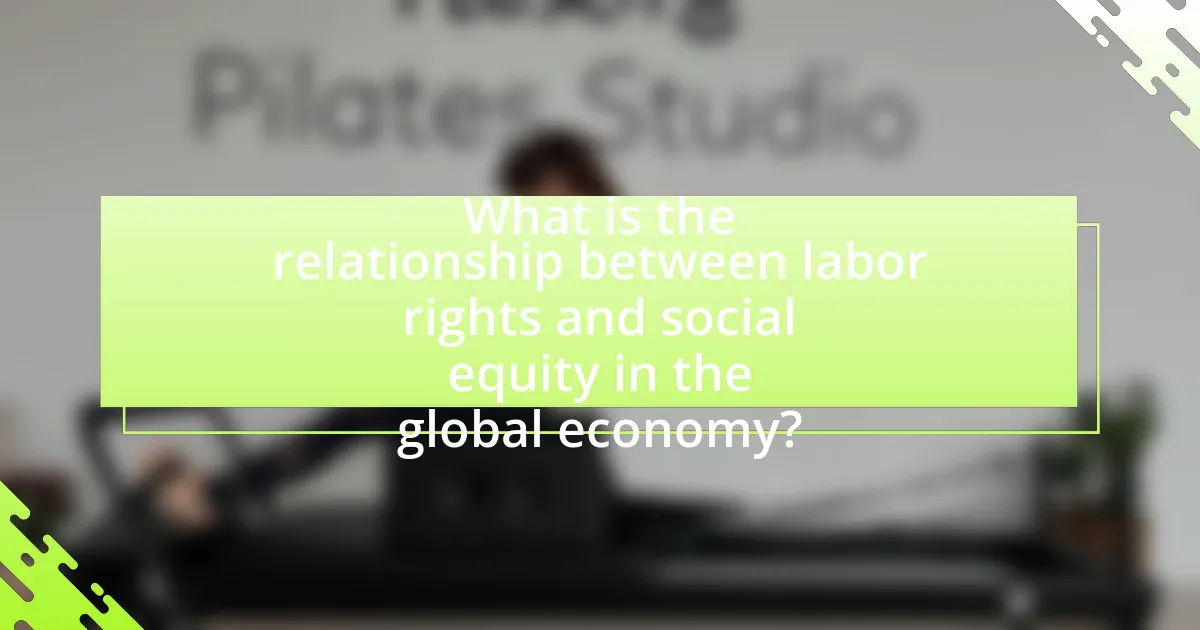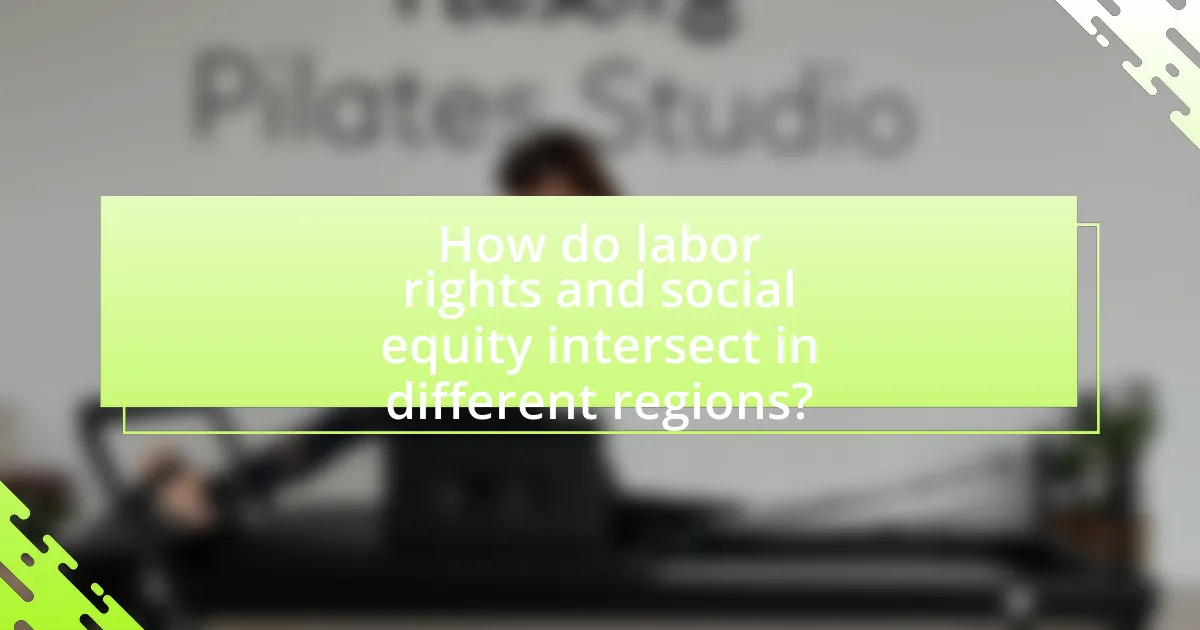The article examines the intrinsic relationship between labor rights and social equity within the global economy, emphasizing how the protection of labor rights—such as fair wages, safe working conditions, and the right to organize—contributes to reduced income inequality and enhanced social mobility. It highlights key components of labor rights and their impact on marginalized communities, as well as the importance of social equity for sustainable economic growth. The article also addresses challenges in enforcing labor rights, the role of multinational corporations, and the influence of government policies, while discussing regional differences and the implications of technology and automation on labor rights. Additionally, it outlines actionable steps individuals and organizations can take to promote labor rights and social equity.

What is the relationship between labor rights and social equity in the global economy?
Labor rights and social equity in the global economy are intrinsically linked, as the protection of labor rights fosters equitable treatment and opportunities for all workers. When labor rights are upheld, such as fair wages, safe working conditions, and the right to organize, it leads to reduced income inequality and improved social mobility. For instance, countries with strong labor protections, like those in Scandinavia, often exhibit lower levels of poverty and greater social equity compared to nations with weaker labor laws. This correlation is supported by research from the International Labour Organization, which indicates that enhancing labor rights can significantly contribute to achieving the United Nations Sustainable Development Goals, particularly those focused on reducing inequalities and promoting decent work for all.
How do labor rights influence social equity?
Labor rights significantly influence social equity by ensuring fair wages, safe working conditions, and the right to organize, which collectively promote economic justice and reduce inequality. When labor rights are upheld, workers receive equitable compensation and benefits, leading to improved living standards and reduced poverty levels. For instance, countries with strong labor protections, such as those in Scandinavia, exhibit lower income inequality and higher social mobility compared to nations with weaker labor rights. This correlation is supported by data from the International Labour Organization, which indicates that stronger labor rights contribute to more equitable income distribution and enhanced social cohesion.
What are the key components of labor rights?
The key components of labor rights include the right to fair wages, safe working conditions, the right to organize and join unions, protection against discrimination, and the right to reasonable working hours. Fair wages ensure that workers receive compensation that reflects their labor value, while safe working conditions protect employees from hazards. The right to organize allows workers to collectively bargain for better terms, and protection against discrimination ensures equal treatment regardless of race, gender, or other characteristics. Reasonable working hours prevent exploitation and promote work-life balance. These components are essential for promoting social equity and ensuring that all workers are treated with dignity and respect in the global economy.
How do labor rights impact marginalized communities?
Labor rights significantly impact marginalized communities by providing them with protections that enhance their economic stability and social equity. When marginalized groups, such as low-income workers, women, and racial minorities, have access to labor rights, they experience improved working conditions, fair wages, and the ability to organize for better treatment. For instance, research from the International Labour Organization indicates that countries with strong labor rights frameworks see lower levels of income inequality, which directly benefits marginalized populations. Additionally, the enforcement of labor rights can lead to increased participation in the formal economy, reducing vulnerability to exploitation and poverty.
Why is social equity important in the global economy?
Social equity is important in the global economy because it promotes fairness and inclusivity, which are essential for sustainable economic growth. When social equity is prioritized, marginalized groups gain access to resources, opportunities, and decision-making processes, leading to a more balanced distribution of wealth and power. Research indicates that countries with higher levels of social equity experience lower rates of poverty and inequality, which in turn fosters economic stability and growth. For instance, the World Bank has reported that reducing income inequality can significantly enhance economic productivity and social cohesion, demonstrating the direct link between social equity and economic performance.
What are the indicators of social equity?
Indicators of social equity include access to quality education, healthcare, and employment opportunities, as well as income distribution and social mobility. These indicators reflect the fairness and justice within a society, demonstrating how resources and opportunities are allocated among different groups. For instance, the World Bank emphasizes that equitable access to education can significantly reduce poverty and improve economic outcomes, highlighting the correlation between educational equity and overall social equity. Additionally, the Gini coefficient is a statistical measure used to gauge income inequality, providing insight into the distribution of wealth within a population, which is a critical aspect of social equity.
How does social equity affect economic growth?
Social equity positively affects economic growth by promoting inclusive participation in the economy, which leads to higher productivity and innovation. When all individuals, regardless of their background, have equal access to education, employment, and resources, the workforce becomes more skilled and diverse. For instance, research from the International Labour Organization indicates that reducing income inequality can increase GDP growth by up to 0.35% annually in developed countries. Additionally, equitable labor rights enhance job satisfaction and retention, further contributing to economic stability and growth.
What challenges exist in ensuring labor rights and social equity?
Ensuring labor rights and social equity faces significant challenges, including inadequate legal protections, lack of enforcement mechanisms, and systemic inequalities. In many countries, labor laws are either insufficient or poorly enforced, leading to widespread violations of workers’ rights, such as unsafe working conditions and unfair wages. For instance, the International Labour Organization reported that 2.7 million workers die each year due to occupational accidents and diseases, highlighting the urgent need for stronger protections. Additionally, marginalized groups, including women and minorities, often face discrimination in the workplace, exacerbating social inequities. According to the World Economic Forum, the gender pay gap persists globally, with women earning approximately 63% of what men earn, illustrating the intersection of labor rights and social equity challenges.
What role do multinational corporations play in labor rights violations?
Multinational corporations significantly contribute to labor rights violations by prioritizing profit over ethical labor practices. These corporations often exploit weaker labor laws in developing countries, leading to poor working conditions, low wages, and inadequate labor protections. For instance, a report by the International Labour Organization indicates that workers in supply chains of multinational companies frequently face violations such as forced labor and child labor, particularly in industries like textiles and agriculture. This exploitation is driven by the corporations’ pursuit of cost reduction and competitive advantage, which undermines labor rights and social equity in the global economy.
How do government policies affect labor rights and social equity?
Government policies significantly influence labor rights and social equity by establishing legal frameworks that protect workers and promote fair treatment. For instance, policies such as minimum wage laws, workplace safety regulations, and anti-discrimination laws directly enhance labor rights, ensuring that workers receive fair compensation and are protected from exploitation. According to the International Labour Organization, countries with strong labor laws tend to have lower levels of income inequality and better social equity outcomes. Furthermore, government initiatives like social security programs and access to healthcare contribute to social equity by providing safety nets for vulnerable populations, thereby reducing disparities in economic opportunities.

How do labor rights and social equity intersect in different regions?
Labor rights and social equity intersect in different regions through varying levels of legal protections, economic conditions, and cultural attitudes towards workers. In regions with strong labor rights, such as Scandinavia, there is a high degree of social equity, evidenced by comprehensive labor laws, strong unions, and policies that promote fair wages and working conditions. Conversely, in regions like Southeast Asia, where labor rights are often weak, social equity tends to be lower, as seen in the prevalence of exploitative labor practices and inadequate protections for workers. Studies indicate that countries with robust labor rights frameworks, such as Germany, experience lower income inequality and better social outcomes compared to those with minimal protections, like Bangladesh, where labor rights violations are common and social disparities are pronounced.
What are the regional differences in labor rights enforcement?
Regional differences in labor rights enforcement are significant, with variations largely influenced by economic development, political systems, and cultural attitudes towards labor. For instance, in Western Europe, countries like Germany and Sweden have robust labor protections and enforcement mechanisms, supported by strong trade unions and comprehensive labor laws. In contrast, many countries in Southeast Asia, such as Vietnam and Indonesia, exhibit weaker enforcement of labor rights, often due to less stringent regulations and limited union power, leading to issues like child labor and unsafe working conditions. According to the International Labour Organization, enforcement disparities are evident in the Global Wage Report, which highlights that regions with higher economic development tend to have better labor rights enforcement compared to developing regions where labor exploitation is more prevalent.
How do cultural factors influence labor rights in various countries?
Cultural factors significantly influence labor rights in various countries by shaping societal norms, values, and expectations regarding work and workers’ rights. For instance, in countries with collectivist cultures, such as Japan and South Korea, there is often a stronger emphasis on group harmony and employee loyalty, which can lead to more robust labor protections and collective bargaining practices. Conversely, in individualistic cultures like the United States, labor rights may be less prioritized, focusing more on personal achievement and less on collective worker welfare.
Additionally, historical contexts play a crucial role; countries with a history of labor movements, such as Sweden, tend to have more established labor rights frameworks compared to nations where labor movements were suppressed. According to the International Labour Organization, countries with strong cultural support for labor rights often see lower levels of inequality and better working conditions, demonstrating a direct correlation between cultural attitudes and the enforcement of labor rights.
What are the consequences of weak labor rights in developing nations?
Weak labor rights in developing nations lead to exploitation of workers, resulting in low wages, poor working conditions, and lack of job security. These conditions contribute to increased poverty levels, as workers are unable to earn a living wage that supports their families. For instance, according to the International Labour Organization, approximately 60% of workers in developing countries earn less than the minimum wage, which exacerbates economic inequality. Additionally, weak labor rights hinder access to social protections, such as healthcare and retirement benefits, further entrenching cycles of poverty. The absence of collective bargaining rights limits workers’ ability to negotiate for better conditions, leading to a workforce that is vulnerable and marginalized.
How do international organizations address labor rights and social equity?
International organizations address labor rights and social equity through the establishment of frameworks, guidelines, and monitoring mechanisms that promote fair labor practices globally. For instance, the International Labour Organization (ILO) sets international labor standards, such as the Fundamental Principles and Rights at Work, which include the right to freely chosen employment, the elimination of forced labor, the abolition of child labor, and the elimination of discrimination in employment. These standards are reinforced by conventions that member states are encouraged to ratify and implement.
Additionally, organizations like the United Nations (UN) advocate for social equity by integrating labor rights into broader human rights agendas, emphasizing the importance of decent work as a component of sustainable development. The UN’s Sustainable Development Goals (SDGs), particularly Goal 8, aim to promote inclusive and sustainable economic growth, employment, and decent work for all, thereby linking labor rights directly to social equity.
Monitoring and reporting mechanisms, such as the ILO’s annual reports and the UN’s Universal Periodic Review, provide accountability and transparency, ensuring that countries adhere to their commitments regarding labor rights and social equity. These efforts collectively contribute to a global framework that seeks to improve working conditions and promote equity in the labor market.
What initiatives have been implemented by the United Nations?
The United Nations has implemented several initiatives aimed at promoting labor rights and social equity globally. Notable initiatives include the Sustainable Development Goals (SDGs), particularly Goal 8, which focuses on promoting sustained, inclusive, and sustainable economic growth, full and productive employment, and decent work for all. Additionally, the International Labour Organization (ILO), a UN agency, has established conventions and recommendations that set international labor standards, addressing issues such as child labor, forced labor, and discrimination in the workplace. These initiatives are supported by various UN programs and partnerships that aim to enhance labor rights and promote social equity, thereby contributing to a more equitable global economy.
How do trade agreements impact labor rights and social equity?
Trade agreements significantly impact labor rights and social equity by establishing regulations that can either enhance or undermine workers’ protections. For instance, agreements like the North American Free Trade Agreement (NAFTA) included provisions that aimed to improve labor standards, but often failed to enforce them effectively, leading to wage stagnation and poor working conditions in certain sectors. Research by the Economic Policy Institute indicates that trade agreements can exacerbate income inequality, as they may favor capital over labor, resulting in job losses in higher-wage industries while creating low-wage jobs in others. Additionally, the lack of strong labor rights protections in many trade agreements can lead to exploitation of workers, particularly in developing countries, where social equity is further compromised.
What role does public awareness play in promoting labor rights?
Public awareness plays a crucial role in promoting labor rights by mobilizing public opinion and influencing policy changes. When individuals are informed about labor rights issues, such as fair wages and safe working conditions, they are more likely to advocate for these rights, leading to increased pressure on governments and corporations to implement reforms. For instance, campaigns like the Fair Trade movement have successfully raised awareness about the exploitation of workers in developing countries, resulting in improved labor standards and practices. Studies show that heightened public awareness can lead to significant legislative changes, as seen in the passage of laws aimed at protecting workers’ rights in various countries following widespread advocacy and education efforts.
How can social movements influence labor rights legislation?
Social movements can influence labor rights legislation by mobilizing public support, raising awareness about injustices, and pressuring policymakers to enact reforms. For instance, the labor movement in the United States during the early 20th century successfully advocated for the Fair Labor Standards Act of 1938, which established minimum wage and overtime pay. This was achieved through organized strikes, protests, and lobbying efforts that highlighted the need for better working conditions. Additionally, contemporary movements like the Fight for $15 campaign have significantly impacted discussions around raising the minimum wage across various states, demonstrating how grassroots activism can lead to legislative changes that enhance labor rights.
What strategies can be employed to raise awareness about labor rights?
To raise awareness about labor rights, organizations can implement educational campaigns that inform workers about their rights and legal protections. These campaigns can utilize various platforms, including social media, community workshops, and informational pamphlets, to reach a broad audience. For instance, the International Labour Organization (ILO) emphasizes the importance of education in promoting labor rights, noting that informed workers are more likely to advocate for their rights and report violations. Additionally, partnerships with local businesses and community leaders can enhance outreach efforts, ensuring that the message resonates within specific cultural contexts.

What are the future trends in labor rights and social equity?
Future trends in labor rights and social equity indicate a growing emphasis on inclusive policies and technological integration. As the global economy evolves, there is an increasing push for equitable labor practices, driven by movements advocating for fair wages, improved working conditions, and the protection of marginalized groups. For instance, the International Labour Organization (ILO) reports that countries are increasingly adopting legislation aimed at enhancing workers’ rights, such as the right to organize and collective bargaining. Additionally, the rise of remote work and gig economies is prompting discussions on the need for new frameworks that ensure social protections for all workers, regardless of their employment status. These trends reflect a broader societal recognition of the importance of labor rights as fundamental to achieving social equity.
How is technology impacting labor rights globally?
Technology is significantly impacting labor rights globally by facilitating both the enhancement and erosion of workers’ protections. On one hand, advancements such as digital platforms and automation can improve labor conditions by increasing transparency, enabling remote work, and providing access to information about rights and resources. For instance, apps that connect workers with legal resources can empower them to advocate for their rights more effectively. On the other hand, technology can also undermine labor rights through practices like surveillance, gig economy models that lack benefits, and the displacement of jobs due to automation. According to a report by the International Labour Organization, the rise of the gig economy has led to increased job insecurity and reduced access to social protections for many workers globally. Thus, while technology has the potential to support labor rights, it also poses significant challenges that can threaten them.
What are the implications of automation on labor rights?
Automation significantly impacts labor rights by potentially undermining job security and workers’ bargaining power. As machines and algorithms replace human labor, workers may face increased unemployment and reduced wages, leading to a decline in overall labor rights. For instance, a report by the McKinsey Global Institute estimates that up to 800 million jobs could be displaced by automation by 2030, which highlights the urgency of addressing labor rights in the context of technological advancement. Furthermore, automation can exacerbate income inequality, as the benefits of increased productivity often accrue to employers and shareholders rather than workers, thereby challenging the principles of fair labor practices and social equity.
How can technology be leveraged to promote social equity?
Technology can be leveraged to promote social equity by enhancing access to information, resources, and opportunities for marginalized communities. For instance, digital platforms can provide educational resources and training programs that empower individuals with skills necessary for better employment. According to a report by the International Labour Organization, access to technology can reduce barriers to job opportunities, particularly in developing regions, where 1.7 billion people remain unbanked and lack access to financial services. Furthermore, technology can facilitate remote work, allowing individuals from disadvantaged backgrounds to participate in the global economy without geographical constraints. This shift not only promotes inclusivity but also helps to bridge income disparities, as evidenced by studies showing that remote work can increase earnings for low-income workers by up to 20%.
What best practices can organizations adopt to enhance labor rights?
Organizations can enhance labor rights by implementing comprehensive policies that promote fair wages, safe working conditions, and the right to collective bargaining. Establishing transparent grievance mechanisms allows workers to report violations without fear of retaliation, fostering an environment of trust and accountability. Additionally, organizations should conduct regular training on labor rights for both management and employees to ensure awareness and compliance. Research indicates that companies with strong labor rights practices experience lower turnover rates and higher employee satisfaction, which can lead to increased productivity and profitability. For example, a study by the International Labour Organization found that countries with robust labor rights frameworks have better economic performance and social equity outcomes.
How can companies ensure compliance with labor rights standards?
Companies can ensure compliance with labor rights standards by implementing comprehensive policies that align with international labor laws and conducting regular audits. These policies should include clear guidelines on worker rights, safety standards, and anti-discrimination measures. Regular audits, both internal and external, help identify non-compliance issues and areas for improvement. According to the International Labour Organization, adherence to these standards not only protects workers but also enhances a company’s reputation and operational efficiency, ultimately contributing to social equity in the global economy.
What role does corporate social responsibility play in promoting social equity?
Corporate social responsibility (CSR) plays a crucial role in promoting social equity by encouraging businesses to adopt ethical practices that benefit all stakeholders, particularly marginalized communities. CSR initiatives often include fair labor practices, equitable pay, and community engagement, which directly address social disparities. For instance, companies that implement fair trade practices ensure that workers receive fair wages and safe working conditions, thereby reducing income inequality. Research by the Harvard Business Review indicates that firms with strong CSR commitments tend to have better employee satisfaction and retention rates, which contributes to a more equitable workplace. Additionally, CSR efforts can lead to increased investment in local communities, fostering economic development and social mobility.
What actionable steps can individuals take to support labor rights?
Individuals can support labor rights by advocating for fair wages and safe working conditions. This can be achieved by participating in campaigns that promote living wages, such as the Fight for $15 movement, which has successfully raised minimum wage standards in various regions. Additionally, individuals can support labor unions by joining or donating to organizations that represent workers’ interests, as unions have historically played a crucial role in securing better labor conditions. Engaging in consumer activism, such as choosing to buy from companies with fair labor practices, further reinforces the demand for ethical treatment of workers. According to the International Labour Organization, countries with strong labor rights protections experience lower levels of inequality, highlighting the importance of individual actions in promoting social equity within the global economy.
